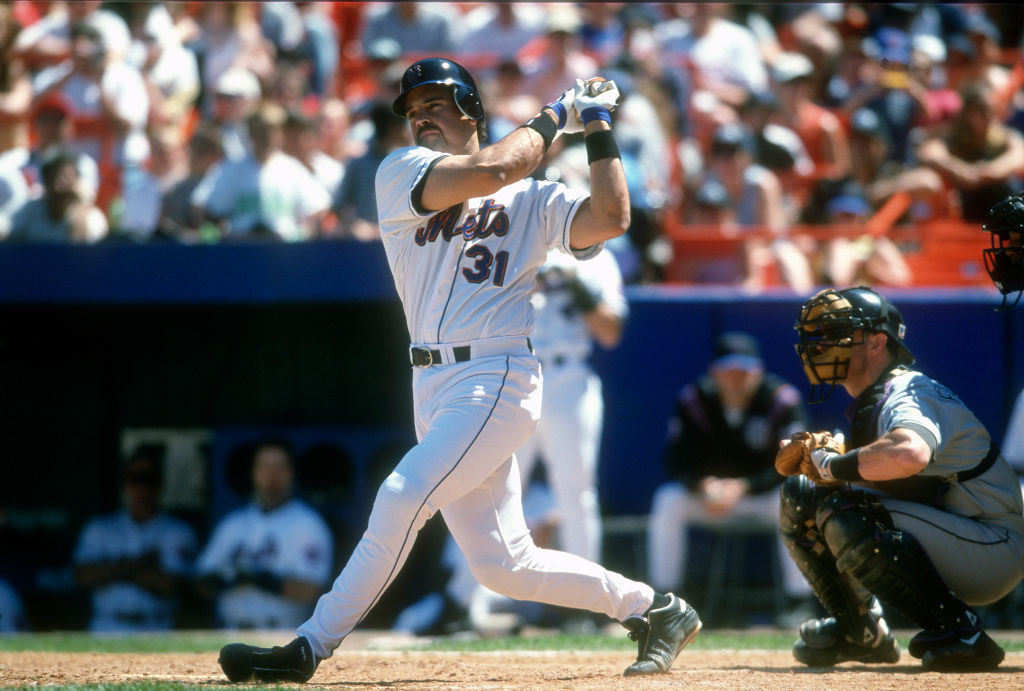MLB
Mike Piazza Used His $70 Million Net Worth to Buy an Italian Soccer Team but Drove It Into Bankruptcy

In New York City, Mets fans still remember Mike Piazza fondly. During his time in Queens, the catcher was an offensive force capable of crushing home runs with incredible ease; one of those, which came after 9/11, still lives on in sporting lore. In Italy, however, sports fans have a different image of Piazza.
In 2016, Mike Piazza used his $70 million net worth to buy A.C. Reggiana, an Italian third-tier soccer team. The former catcher laid out a plan to bring the club back to prominence but ended up driving it back into bankruptcy.
Mike Piazza’s Major League Baseball career
Growing up, Vince Piazza dreamed of becoming a professional baseball player. While he didn’t become a star, he did strike it rich as a businessman; eventually, he turned his attention to his son, Mike.
After years of tireless instruction, Mike Piazza was drafted by Los Angeles Dodgers in the 62nd round of the 1998 MLB draft. The move was more of a favor than anything else—Tommy Lasorda was Vince’s childhood friend—but it turned into a steal. In the Dodgers organization, Mike moved behind the plate and developed into a dynamic offensive catcher; by September 1992, he was in the pros.
The following year, Piazza earned the National League Rookie of the Year award, hitting .318 and belting 35 home runs. While he continued to produce, the Dodgers traded the catcher to the Marlins in 1998; after a week in Florida, he joined the New York Mets.
In Queens, Piazza proved to be both a star and a fan favorite, powering the Mets to the 2000 World Series. The following fall, however, he would write his name in New York sporting lore by smashing a go-ahead home run in the first game back after 9/11.
After brief spells with the Padres and A’s, Piazza called it a career. He posted a cumulative .308 batting average with 427 home runs and 1,335 RBIs and was inducted into the Baseball Hall of Fame in 2016.
Mike Piazza becomes an Italian soccer owner
After retiring from professional baseball, Mike Piazza didn’t abandon professional sports forever. With an estimated net worth of $70 million, he began looking into purchasing a soccer team and eventually settled on A.C. Reggiana, a club in Italy’s third-tier. At first, it seemed like a perfect fit.
When Piazza arrived in Reggio Emilia, he seemed like a savior. While fans packed the public square and the former catcher spoke of plans to bring the club back to the top division, things turned out different in reality. Running an organization, let alone one in a foreign country, is never easy.
Suddenly, costs went through the roof. The club’s staff ballooned; players and executives received massive contracts. On the field, however, little changed.
“The year before Piazza bought Reggiana, the club finished in seventh place in its division, with operational costs of around 500,000 euros,” Robert Andrew Powell explained in The Athletic. “In Piazza’s first season with the club, Reggiana finished in fifth place, but at a cost to Piazza of more than six million euros.”
The tragic end of A.C. Reggiana
After that season, Mike Piazza put his wife, Alicia, in charge of the club. She immediately started cutting costs; while some measures, like having players wash their own uniforms, seemed insulting, things would still get worse.
Despite the off-field issues, Reggiana finished fourth in the division and qualified for the playoff tournament; if they won, they would earn promotion to Serie B and move one step closer toward the top flight. After a controversial penalty call, however, they were eliminated in the quarterfinals.
Despite the pain, everything seemed in a good spot for the next campaign; barring the penalty kick, promotion seemed within reach. The club, however, wouldn’t get that opportunity. Shortly after the playoff defeat, Piazza put the team up for sale. A buyer was never found, and the club missed the registration deadline for the new season; eventually, a judge declared the club bankrupt.
“Maybe it could have been different,” Piazza told Powell. “If I could re-engineer the whole thing, I’d go back and save a lot of the money that was squandered. I’d put in my own people, people that knew what we’re doing. But that’s what we learn! We learn those lessons the hard way! There’s a lot of shoulda, coulda, woulda, but I don’t regret doing it.”











